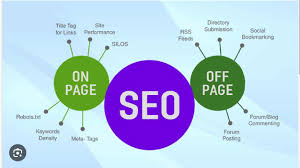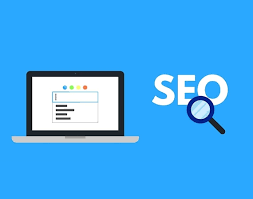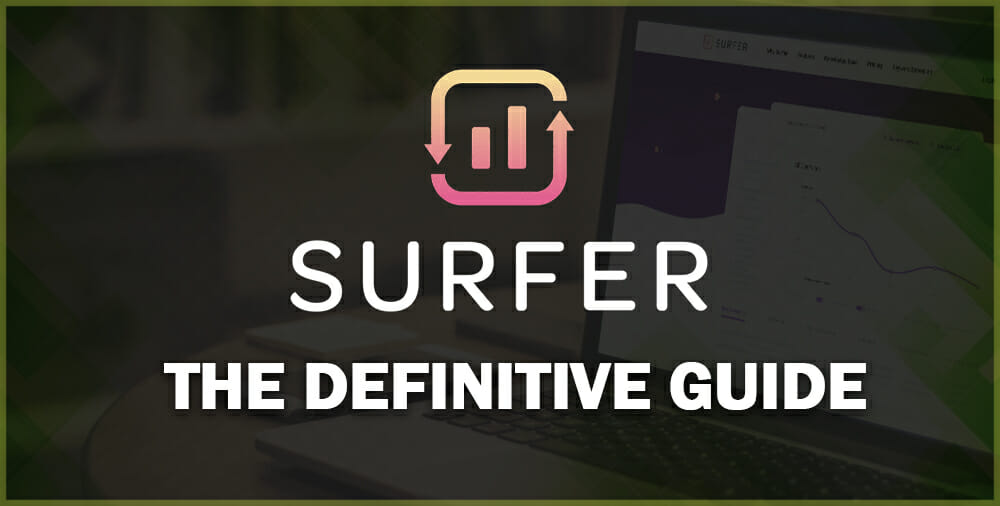SEO: On-Page vs Off-Page
The Importance of SEO: On-Page and Off-Page Strategies
Search Engine Optimization (SEO) is a crucial aspect of digital marketing that focuses on improving a website’s visibility in search engine results. There are two main categories of SEO strategies: On-Page and Off-Page.
On-Page SEO
On-Page SEO refers to the optimization techniques applied directly on the website to enhance its search engine ranking. This includes factors such as:
- Keyword Optimization: Strategic placement of relevant keywords in titles, meta descriptions, headings, and content.
- Quality Content: Creating high-quality, relevant, and engaging content that satisfies user intent.
- Meta Tags: Writing compelling meta titles and descriptions that entice users to click through.
- URL Structure: Creating clean and user-friendly URLs that include target keywords.
- Internal Linking: Linking relevant pages within the website to improve navigation and distribute link equity.
Off-Page SEO
Off-Page SEO involves external factors that impact a website’s search engine rankings. These strategies focus on building a website’s authority, credibility, and popularity through activities such as:
- Backlink Building: Acquiring high-quality backlinks from reputable websites to improve domain authority.
- Social Media Marketing: Leveraging social media platforms to promote content and engage with audiences.
- Online Reputation Management: Monitoring and managing online reviews, mentions, and brand perception across the web.
- Influencer Outreach: Collaborating with influencers or industry experts to increase brand visibility and credibility.
The Synergy Between On-Page and Off-Page SEO
To achieve optimal results in search engine rankings, it is essential to implement a holistic approach that combines both On-Page and Off-Page SEO strategies. While On-Page SEO ensures that your website is technically sound, relevant, and user-friendly, Off-Page SEO helps build authority, trustworthiness, and credibility in the eyes of search engines.
In conclusion, mastering both On-Page and Off-Page SEO techniques is key to improving your website’s visibility, attracting organic traffic, and ultimately driving business growth in the competitive online landscape.
Understanding On-Page and Off-Page SEO: 33 Common Questions Answered
- What is on off-page SEO?
- What is on-page and off-page SEO list?
- Which is better on page SEO or off-page SEO?
- What is off-page SEO example?
- What activities will we do on-page and off-page SEO?
- Is on page or off-page SEO more important?
- What are SEO factors on-page off-page?
- What is SEO on-page and off-page optimization?
- What is the difference between on-page and off-page SEO?
- What is a on-page SEO?
- What is on-page & off-page SEO?
- Which SEO is better on-page or off-page?
- What is on-page off-page and technical SEO?
- Why are both on and off site SEO important?
- What is done in off-page SEO?
- What is most important on-page SEO or off-page SEO?
- How do you do on-page and off-page optimization?
- What are on-page SEO and off-page SEO factors?
- What is Offsite SEO?
- Is local SEO off-page or on-page?
- How to do on and off-page SEO?
- Which is better on-page or off-page SEO?
- What is offpage SEO?
- What is on-page technical and off-page SEO?
- What is the 80/20 rule for SEO?
- What is online and offline SEO?
- What is the difference between on-page and of page?
- What is a difference between on-page SEO and on site SEO?
- What is an off-page SEO?
- What comes in off-page SEO?
- What is on-page SEO?
- What is difference between on-page and off-page SEO?
- What comes under on-page SEO?
What is on off-page SEO?
On-Page SEO and Off-Page SEO are two essential components of Search Engine Optimization (SEO) that work together to enhance a website’s visibility and ranking in search engine results. On-Page SEO involves optimizing elements within the website itself, such as content, meta tags, and internal linking, to improve its relevance and user experience. On the other hand, Off-Page SEO focuses on external factors like backlinks, social media presence, and online reputation management to build authority and credibility for the website across the web. By combining both On-Page and Off-Page SEO strategies effectively, businesses can achieve higher search engine rankings and attract more organic traffic to their websites.
What is on-page and off-page SEO list?
When it comes to SEO, understanding the distinction between on-page and off-page strategies is essential for improving a website’s search engine visibility. On-page SEO involves optimising elements directly on the website, such as keyword placement, quality content creation, meta tags, URL structure, and internal linking. In contrast, off-page SEO focuses on external factors like building backlinks from reputable sites, engaging in social media marketing, managing online reputation, and collaborating with influencers. By implementing a comprehensive on-page and off-page SEO list, businesses can enhance their online presence, attract organic traffic, and boost their search engine rankings effectively.
Which is better on page SEO or off-page SEO?
When considering the effectiveness of SEO strategies, the question of whether on-page SEO or off-page SEO is better often arises. On-page SEO focuses on optimizing elements within the website itself, such as content and meta tags, to improve search engine rankings. In contrast, off-page SEO involves external factors like backlinks and social media presence to enhance a website’s authority and credibility. Both on-page and off-page SEO are integral parts of a comprehensive SEO strategy, with each playing a vital role in boosting a website’s visibility and relevance in search results. Ultimately, the synergy between on-page and off-page SEO is key to achieving sustainable long-term success in improving organic traffic and overall online presence.
What is off-page SEO example?
When discussing off-page SEO, an example of a common strategy is building backlinks from reputable and relevant websites. Backlinks serve as endorsements from other sites, indicating to search engines the credibility and authority of your website. By acquiring backlinks through guest blogging, influencer collaborations, or directory submissions, you can improve your website’s visibility and ranking in search engine results pages. This off-page SEO technique not only enhances your site’s reputation but also contributes to boosting organic traffic and establishing a strong online presence.
What activities will we do on-page and off-page SEO?
When it comes to implementing a comprehensive SEO strategy, the activities involved in On-Page and Off-Page SEO play a crucial role in enhancing a website’s visibility and search engine rankings. On-Page SEO activities typically include keyword optimization, content creation, meta tag optimization, URL structuring, and internal linking to ensure that the website is optimised for search engines and user experience. On the other hand, Off-Page SEO activities focus on building authority through backlink building, social media marketing, online reputation management, and influencer outreach to establish credibility and enhance the website’s reputation across the web. By combining these strategic activities both on-page and off-page, businesses can effectively improve their online presence and attract organic traffic for sustainable growth in the digital landscape.
Is on page or off-page SEO more important?
When it comes to the debate on whether On-Page or Off-Page SEO holds more significance, the answer lies in understanding that both aspects are crucial for a comprehensive SEO strategy. On-Page SEO focuses on optimizing the content and structure of a website, ensuring it is user-friendly and keyword-rich. In contrast, Off-Page SEO involves building authority and credibility through external factors like backlinks and social signals. While On-Page SEO lays the foundation for a well-structured website, Off-Page SEO plays a vital role in enhancing its visibility and reputation across the web. Ultimately, achieving a balance between On-Page and Off-Page SEO is key to maximising a website’s potential in search engine rankings and driving sustainable organic traffic growth.
What are SEO factors on-page off-page?
When it comes to SEO factors, both on-page and off-page elements play a crucial role in determining a website’s search engine ranking. On-page SEO factors refer to optimization strategies applied directly on the website itself, such as keyword placement, quality content creation, meta tags, URL structure, and internal linking. On the other hand, off-page SEO factors involve external activities like building quality backlinks, engaging in social media marketing, managing online reputation, and collaborating with influencers. By combining effective on-page and off-page SEO techniques, businesses can enhance their online visibility, credibility, and ultimately improve their search engine rankings for increased organic traffic and better user engagement.
What is SEO on-page and off-page optimization?
SEO on-page and off-page optimization are two essential components of a comprehensive search engine optimization strategy. On-page optimization involves making strategic improvements directly on the website itself, such as optimizing content with relevant keywords, creating user-friendly URLs, and enhancing meta tags. In contrast, off-page optimization focuses on external factors like building high-quality backlinks, engaging in social media marketing, and managing online reputation to boost the website’s authority and credibility. By combining both on-page and off-page techniques effectively, businesses can improve their search engine rankings, increase organic traffic, and establish a strong online presence that resonates with their target audience.
What is the difference between on-page and off-page SEO?
The fundamental difference between on-page and off-page SEO lies in the focus of optimization efforts. On-page SEO involves refining elements directly within a website to enhance its search engine visibility, such as keyword optimization, content quality, and meta tags. In contrast, off-page SEO concentrates on external factors like backlink building, social media marketing, and online reputation management to boost a website’s authority and credibility across the web. While on-page SEO ensures the website’s content is relevant and user-friendly, off-page SEO aims to establish trustworthiness and popularity beyond the site itself through strategic external tactics.
What is a on-page SEO?
On-Page SEO refers to the practice of optimizing individual web pages to improve their search engine rankings and attract organic traffic. This process involves various techniques such as keyword research, content creation, meta tag optimization, and internal linking. By focusing on On-Page SEO factors, website owners can enhance the relevance, quality, and user experience of their pages, making them more attractive to search engines like Google. Ultimately, effective On-Page SEO helps websites rank higher in search results and drive targeted traffic to their online platforms.
What is on-page & off-page SEO?
On-page and off-page SEO are two fundamental components of search engine optimization that play a critical role in improving a website’s visibility and ranking on search engine results pages. On-page SEO involves optimizing factors directly on the website itself, such as keyword placement, quality content creation, meta tags, URL structure, and internal linking. In contrast, off-page SEO focuses on external strategies like building backlinks from reputable websites, engaging in social media marketing, managing online reputation, and collaborating with influencers to enhance the website’s authority and credibility. Both on-page and off-page SEO work hand in hand to boost a website’s online presence and drive organic traffic for sustainable growth.
Which SEO is better on-page or off-page?
When it comes to the debate on whether On-Page SEO is better than Off-Page SEO or vice versa, the answer lies in understanding that both play crucial roles in a comprehensive SEO strategy. On-Page SEO focuses on optimizing the content and structure of a website to improve its search engine ranking, while Off-Page SEO involves external factors like backlinks and social signals to enhance a site’s authority. The effectiveness of each depends on the specific goals and needs of a website. Ultimately, a balanced approach that integrates both On-Page and Off-Page SEO techniques is key to achieving sustainable and long-term success in improving online visibility and driving organic traffic.
What is on-page off-page and technical SEO?
Understanding the distinctions between on-page, off-page, and technical SEO is essential for a comprehensive grasp of search engine optimization strategies. On-page SEO involves optimizing elements within a website itself, such as content quality, keyword integration, and meta tags. Off-page SEO focuses on external factors like backlinks, social media presence, and online reputation management to enhance a site’s authority and credibility. Technical SEO pertains to the technical aspects of a website, including site speed, mobile-friendliness, and structured data markup, which contribute to improved search engine rankings and user experience. By incorporating all three components effectively, businesses can establish a strong online presence and drive organic traffic to their websites.
Why are both on and off site SEO important?
Understanding the significance of both on-site and off-site SEO is crucial for achieving successful digital marketing outcomes. On-page SEO ensures that your website is optimised for search engines, making it easier for them to crawl and index your content. It focuses on factors like keyword placement, quality content creation, and user experience, all of which directly impact your website’s visibility in search results. On the other hand, off-page SEO plays a vital role in building your website’s authority and credibility through external factors like backlinks and social signals. By combining both on-page and off-page SEO strategies, you create a comprehensive approach that enhances your online presence, drives organic traffic, and improves your search engine rankings effectively.
What is done in off-page SEO?
In off-page SEO, the focus shifts to activities that take place outside the website itself to improve its search engine ranking and online visibility. This includes strategies such as building high-quality backlinks from authoritative websites, engaging in social media marketing to promote content and interact with audiences, managing online reputation through monitoring reviews and brand mentions, and collaborating with influencers or industry experts to enhance brand credibility. Off-page SEO plays a crucial role in establishing a website’s authority and trustworthiness in the eyes of search engines, ultimately contributing to higher rankings and increased organic traffic.
What is most important on-page SEO or off-page SEO?
When considering the importance of on-page SEO versus off-page SEO, it is essential to recognise that both play significant roles in enhancing a website’s search engine visibility and overall performance. On-page SEO focuses on optimising the content and structure of the website itself, ensuring it is relevant, user-friendly, and technically sound. In contrast, off-page SEO involves building authority and credibility through external factors such as backlinks and social signals. While both aspects are crucial for a comprehensive SEO strategy, the synergy between on-page and off-page efforts is what ultimately drives sustainable organic growth and success in search engine rankings. Each serves a unique purpose in boosting a website’s online presence, making them equally important components of a well-rounded SEO strategy.
How do you do on-page and off-page optimization?
When it comes to on-page and off-page optimization in SEO, the key lies in a strategic and comprehensive approach. For on-page optimization, it is crucial to conduct thorough keyword research and strategically integrate relevant keywords into titles, meta descriptions, headings, and content. Creating high-quality, engaging content that aligns with user intent is also essential. On the other hand, off-page optimization involves building a strong backlink profile from reputable websites, engaging in social media marketing to amplify content reach, managing online reputation effectively, and collaborating with influencers for increased brand visibility. By combining these on-page and off-page strategies harmoniously, businesses can enhance their online presence, improve search engine rankings, and drive organic traffic to their websites effectively.
What are on-page SEO and off-page SEO factors?
When it comes to Search Engine Optimization (SEO), understanding the distinction between on-page and off-page factors is crucial for enhancing a website’s visibility in search engine results. On-page SEO factors encompass elements that can be directly controlled and optimized within the website itself, such as keyword placement, content quality, meta tags, URL structure, and internal linking. On the other hand, off-page SEO factors involve external strategies like backlink building, social media marketing, online reputation management, and influencer outreach to boost a website’s authority and credibility across the web. By effectively utilising both on-page and off-page SEO factors, businesses can improve their search engine rankings and attract organic traffic to their websites.
What is Offsite SEO?
Offsite SEO, also known as Off-Page SEO, refers to the strategies and activities implemented outside of a website to enhance its search engine rankings and improve online visibility. Offsite SEO primarily focuses on building a website’s authority, credibility, and reputation through external factors such as backlink building, social media engagement, online reputation management, and influencer outreach. By leveraging Offsite SEO techniques effectively, businesses can strengthen their online presence, attract more organic traffic, and establish trust with search engines and users alike.
Is local SEO off-page or on-page?
Local SEO involves elements of both On-Page and Off-Page strategies. While On-Page SEO plays a crucial role in optimising website content, meta tags, and local keywords to improve local search rankings, Off-Page SEO activities such as building local citations, acquiring backlinks from local directories, and managing online reviews also contribute significantly to enhancing a business’s visibility in local search results. Therefore, local SEO can be seen as a blend of both On-Page and Off-Page techniques tailored specifically to target a geographically defined audience and drive foot traffic to physical locations.
How to do on and off-page SEO?
When it comes to implementing on and off-page SEO strategies, a comprehensive approach is essential for achieving optimal results in search engine rankings. For on-page SEO, focus on keyword optimization by strategically placing relevant keywords in titles, meta descriptions, and content. Create high-quality content that satisfies user intent and engages visitors. Ensure clean URL structures and internal linking to enhance website navigation and boost visibility. On the other hand, off-page SEO involves building authority through backlink acquisition from reputable sites, engaging in social media marketing to promote content, managing online reputation effectively, and collaborating with influencers to increase brand credibility. By combining these on-page and off-page tactics effectively, businesses can enhance their online presence and attract organic traffic for sustained growth.
Which is better on-page or off-page SEO?
When it comes to the debate between on-page and off-page SEO, the question of which is better often arises. In reality, both on-page and off-page SEO are essential components of a comprehensive search engine optimization strategy. On-page SEO focuses on optimizing the content and structure of a website to improve its visibility in search engine results, while off-page SEO involves external factors like backlinks and social signals that contribute to a site’s authority and credibility. The effectiveness of each strategy depends on the specific goals and needs of a website, making it crucial to strike a balance between on-page and off-page tactics for optimal results in enhancing online presence and ranking performance.
What is offpage SEO?
Off-Page SEO refers to the external strategies and activities undertaken outside of a website to improve its search engine ranking and visibility. This includes building quality backlinks from reputable websites, engaging in social media marketing to promote content, managing online reputation through monitoring reviews and mentions, and collaborating with influencers to enhance brand credibility. Off-Page SEO plays a crucial role in establishing a website’s authority, trustworthiness, and relevance in the eyes of search engines, ultimately contributing to higher organic rankings and increased online visibility.
What is on-page technical and off-page SEO?
On-page technical SEO refers to the optimisation strategies implemented directly on a website to improve its search engine visibility. This includes aspects such as keyword placement, meta tags, URL structure, and internal linking. On the other hand, off-page SEO involves external factors that influence a website’s ranking, such as backlink building, social media marketing, online reputation management, and influencer outreach. Both on-page technical and off-page SEO are essential components of a comprehensive SEO strategy aimed at enhancing a website’s performance and authority in search engine results pages.
What is the 80/20 rule for SEO?
The 80/20 rule for SEO, also known as the Pareto Principle, suggests that roughly 80% of the results in search engine optimisation come from 20% of the efforts. In the context of on-page and off-page SEO strategies, this principle implies that focusing on key activities that yield the most significant impact can generate a majority of positive outcomes for a website’s search engine ranking. By prioritising efforts on critical factors such as high-quality content creation, strategic keyword usage, effective backlink building, and social media engagement, businesses can maximise their SEO potential and achieve substantial improvements in online visibility and organic traffic.
What is online and offline SEO?
Online and offline SEO refer to the different strategies used to improve a website’s search engine visibility in digital marketing. Online SEO, also known as On-Page SEO, involves optimising the website itself through tactics such as keyword research, content creation, and meta tags to enhance its online presence. In contrast, offline SEO, or Off-Page SEO, focuses on external factors like backlink building, social media marketing, and online reputation management to boost the website’s authority and credibility across the web. Both online and offline SEO strategies work together synergistically to enhance a website’s search engine rankings and drive organic traffic for sustainable online success.
What is the difference between on-page and of page?
When it comes to Search Engine Optimization (SEO), understanding the distinction between on-page and off-page strategies is essential. On-page SEO involves optimizing elements directly on a website, such as keyword placement, content quality, and meta tags, to improve search engine rankings. On the other hand, off-page SEO focuses on external factors like backlink building, social media marketing, and online reputation management to enhance a website’s authority and credibility across the web. While on-page SEO ensures website relevance and user-friendliness, off-page SEO plays a crucial role in building trustworthiness and visibility in search engine results. Mastering both aspects is key to achieving comprehensive SEO success.
What is a difference between on-page SEO and on site SEO?
When discussing SEO strategies, it’s important to distinguish between on-page SEO and on-site SEO. On-page SEO refers to the specific optimization techniques applied directly on individual web pages to improve their search engine rankings. This includes factors such as keyword optimization, content quality, meta tags, and internal linking. On the other hand, on-site SEO encompasses a broader approach that focuses on optimizing the entire website as a whole, including technical aspects like site structure, site speed, mobile-friendliness, and overall user experience. While on-page SEO targets individual page elements, on-site SEO takes into account the website’s overall performance and functionality to enhance its visibility and ranking in search engine results pages.
What is an off-page SEO?
Off-Page SEO refers to the external factors and strategies implemented outside of a website to enhance its search engine visibility and authority. It involves activities such as building high-quality backlinks from reputable websites, engaging in social media marketing to promote content, managing online reputation across various platforms, and collaborating with influencers to boost brand credibility. Off-Page SEO plays a crucial role in establishing a website’s credibility, trustworthiness, and popularity in the eyes of search engines, ultimately contributing to improved search rankings and organic traffic growth.
What comes in off-page SEO?
In off-page SEO, various strategies are employed to enhance a website’s visibility and authority beyond its own domain. Key components of off-page SEO include building high-quality backlinks from reputable websites, engaging in social media marketing to promote content and interact with audiences, managing online reputation through monitoring reviews and brand mentions, and collaborating with influencers or industry experts to boost brand credibility. These external efforts play a crucial role in establishing the website’s credibility, trustworthiness, and relevance in the eyes of search engines, ultimately contributing to improved search engine rankings and increased organic traffic.
What is on-page SEO?
On-page SEO refers to the practice of optimizing individual web pages to improve their search engine rankings and attract relevant organic traffic. It involves various techniques such as keyword optimization, creating high-quality content, optimizing meta tags, improving URL structure, and internal linking. By focusing on on-page SEO strategies, website owners can enhance the visibility of their pages in search engine results pages (SERPs) and provide a better user experience for visitors. Ultimately, on-page SEO plays a crucial role in helping websites rank higher for specific keywords and drive targeted traffic to their site.
What is difference between on-page and off-page SEO?
The fundamental difference between on-page and off-page SEO lies in their focus areas. On-page SEO involves optimising elements within the website itself, such as content, meta tags, and internal links, to improve search engine rankings. Conversely, off-page SEO concentrates on external factors like backlinks, social media presence, and online reputation management to enhance a website’s authority and credibility in the eyes of search engines. While on-page SEO ensures the website is technically sound and relevant to users, off-page SEO aims to build trustworthiness and popularity across the web through strategic external activities. Mastering both aspects is crucial for a comprehensive SEO strategy that boosts online visibility and drives organic traffic.
What comes under on-page SEO?
When discussing on-page SEO, it encompasses a range of optimisation techniques that are directly implemented on a website to enhance its search engine visibility and ranking. Key elements of on-page SEO include strategic keyword placement in titles, meta descriptions, headings, and content, creating high-quality and relevant content that meets user intent, crafting compelling meta tags for improved click-through rates, structuring URLs for user-friendliness and keyword inclusion, as well as internal linking to enhance navigation and distribute link equity within the website. These on-page strategies play a crucial role in driving organic traffic and improving the overall performance of a website in search engine results pages.








